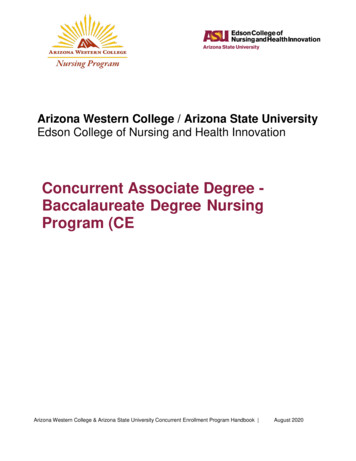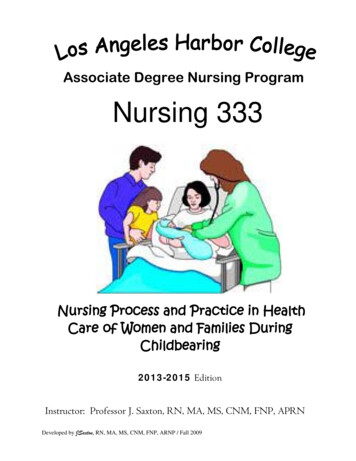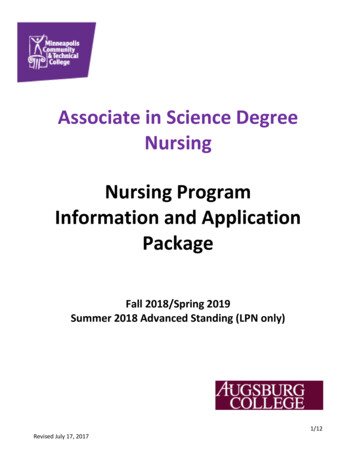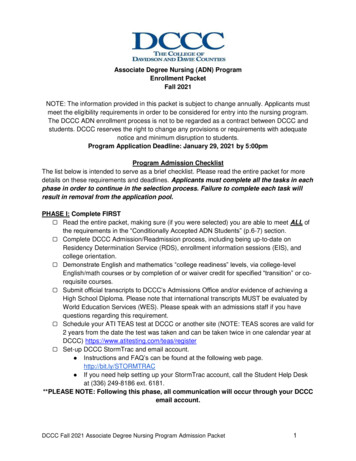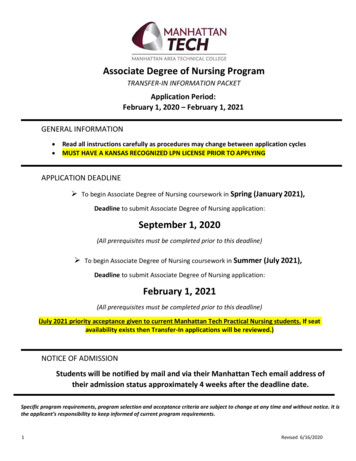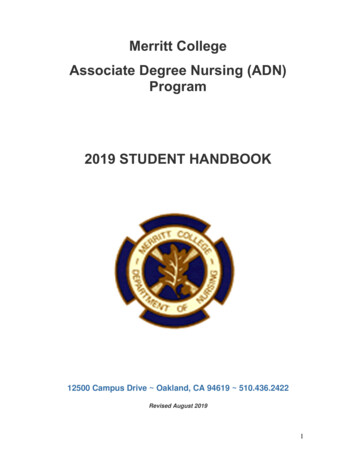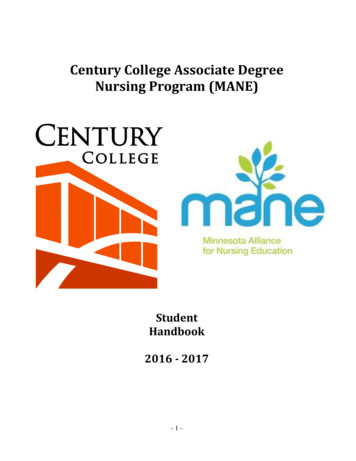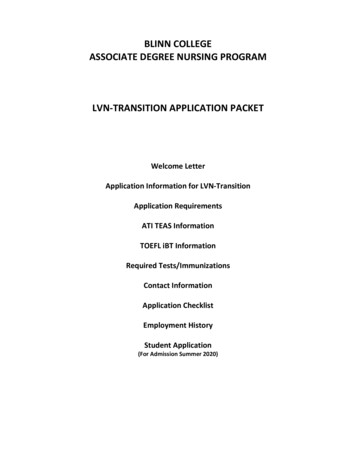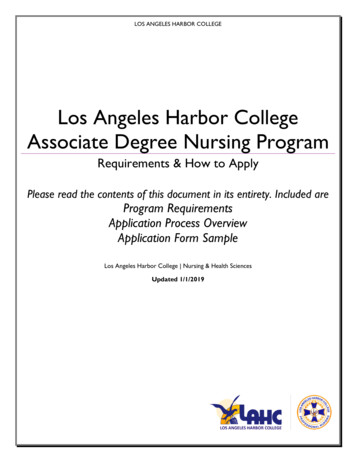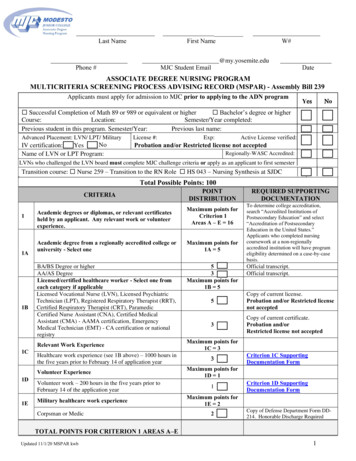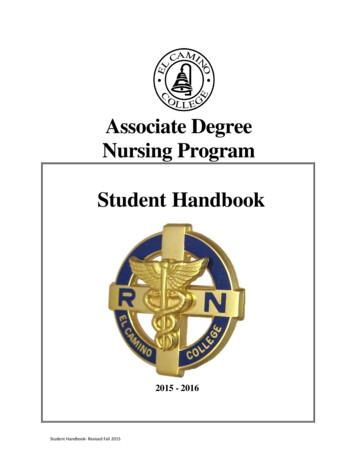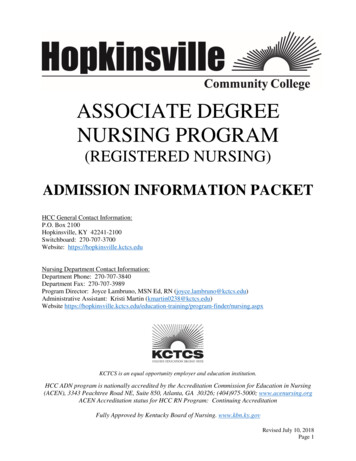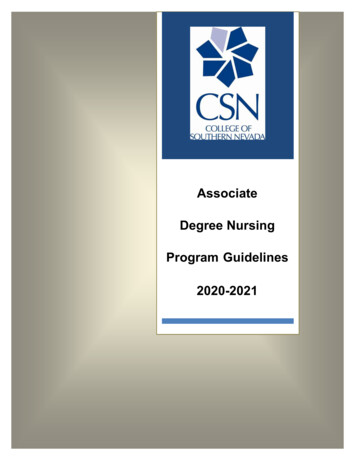
Transcription
AssociateDegree NursingProgram Guidelines2020-2021
Table of ContentsAccreditation/Approval Status of the ADN Program .4Handbook Disclaimer .4Mission Statement . 5Core Values . 5General Information.6Curriculum – Regular Track Sequence.6Curriculum – Extended Track Sequence .7Curriculum – LPN to RN Bridge Track Sequence.8Philosophy.9Organizing Framework.11Organizing Framework Diagram .12Curricular Concept Definitions .13Associate Degree Nursing Student Learning Outcomes.16Associate Degree Nursing Program Outcomes.17Auditing a Course.18Course Registration and Disclaimer.18Professional Standards .19American Nurses Association Code of Ethics for Nurses .20NSNA Code of Academic and Clinical Conduct.21Honor Code . 22Academic Honesty Policy. 22Electronic Device Policy.23Students as Committee Members.24Communications to Students .24Mandatory Advising.24Missed Appointments.25Health Documents.25Name Change .26Academic Policies .27Progression in the Nursing Program.27To Remain in Good Academic Standing.27Track Change Requests .27Grades .28Credit Class Instructional Ratio.28Content Mastery Testing.29Learning Contract.29Unsatisfactory Progress Notification .29Associate Degree Nursing Program GuidelinesPage 2
Attendance and Preparedness. 30Information on Absences from Exams, Lab, or Clinical Practicum .30Information on Tardiness to Exams, Lab, or Clinical Practicum .32Information on Being Unprepared.32Information on Referral to the Nursing Academic Progression and Graduation (APG)Committee .34Faculty Absences.35Course Withdrawal and/or Failure .35Reinstatement to a Nursing Program.36Program Return After Failure First Semester .36Transfer into the Nursing Program.37Medication Dosage Calculation Policy .37Clinical Policies .41Uniform and Dress Code .41Required Equipment .42Clinical Assignments .42Confidentiality of Patient’s Records .43Nursing Documentation Guidelines .43Leveled Clinical Skills Notebook .43Intravenous Therapy .44Clinical Performance .45Clinical Evaluations .45Critical Incident.45Critical Elements .46Engelstad School of Health Sciences ADA Statement .46Tips for Success .47Student-to-Student Tips for Success .48Take Care of Yourself .48Take Care of Each Other .48Take One Day at a Time . 48Take Care of Business .48Appendices .50Nursing Documentation Guidelines .51CSN Policy School of Health Sciences Student Reinstatement.53Student Learning Contract: Theory.56Student Learning Contract: Clinical/Lab .58Lab Tardy . 60Clinical Tardy .61Lab/Clinical Unpreparedness.62Lab/Clinical/Exam Absence .63Recommendation for Removal from a Health Sciences Program.64Name Change .65Associate Degree Nursing Program Graduate Reference .66Equal Opportunity is the Law.69Revised 8/13/2015; Edited 7/18/2016; 6/20/2017; 7/11/2017; 7/20/2018; 7/10/2019; 7/9/2020Associate Degree Nursing Program GuidelinesPage 3
Accreditation/Approval Status of the Associate Degree NursingProgramCSN offers both an AAS degree in Nursing (for students who have not beenpractical/vocational nurses) and an AAS degree in Nursing LPN to RN BridgeEmphasis. Graduates are eligible to apply to write the NCLEX-RN exam for statelicensure. Courses from the AAS degree in Nursing can be applied toward therequirements for a Bachelor of Science in Nursing degree. The CSN programs havefull approval status by the Nevada State Board of Nursing, 4220 S Maryland Pkwy,Suite 300, Las Vegas, NV, 89119, (702) 486-5800 and are accredited by theAccreditation Commission for Education in Nursing, Inc., 3343 Peachtree Rd. N.E.,Suite 850, Atlanta, GA 30326, (404) 975-5000.HANDBOOK DISCLAIMER:PLEASE NOTE THAT THE NURSING PROGRAM GUIDELINES FOR THECURRENT ACADEMIC YEAR WILL BE FOLLOWED. PAST EDITIONS OF THEGUIDELINES WILL NOT BE UTILIZED FOR ANY PURPOSES.AS A RESULT OF THE ONGOING CONCERNS OVER THE COVID-19 PANDEMIC,COURSE SYLLABI MAY BE ADJUSTED BY FACULTY AT ANY TIME DUE TOREQUIRED MANDATES FROM THE CSN, CLINICAL SITES, CDC, AND STATEAND FEDERAL GOVERNMENT ORGANIZATIONS.Associate Degree Nursing Program GuidelinesPage 4
Mission StatementThe CSN Nursing Department’s mission is to graduate competent, compassionate, caringnurses and nursing assistants who strive for excellence in their delivery of care to a diversecommunity. The department supports academic success through student engagement,cultural and scientific literacy, and assisting students to meet their educational andprofessional goals.Adopted Fall 2002: Revised Fall 2007; Fall 2009; Fall 2014; Spring 2017Core ValuesCaringActively create an environment of kindness and compassion that recognizes individualpreferences and needs in order to facilitate and support faculty and students inachievement of the nursing department mission.CommunicationActively create an environment that supports shared decision-making, cohesiveness,collaboration, and teamwork.CompetenceActively create an environment that strives for achievement of the outcomes of theAssociate Degree Nursing program and seeks to increase the level of achievementdefined in these outcomes.CreativityActively create an environment to foster evidence-based innovation in nursing education andpractice. Creativity is the highest level of knowledge described in the Revised Bloom'sTaxonomy.ProfessionalismActively create an environment that insists upon adherence to the standards of nursingeducation and practice including legal, ethical, and professional organization standards.Associate Degree Nursing Program GuidelinesPage 5
General InformationCurriculum – Full Time Sequence (Regular Track) (no nursing coursesduring summer sessions)Prerequisites ENG 101MATH 120 PSY 101BIOL 189BIOL 223Composition 1Fundamentals of College Mathematics(MATH 124 or above recommended)General PsychologyFundamentals of Life ScienceAnatomy & Physiology 13 cr.3 cr.3 cr.4 cr.4 cr.General Education Requirements BIOL 224BIOL 251SOC 101COM 101PSC 101Anatomy & Physiology 2 (prior to 2nd semester)Microbiology (prior to 3rd semester)Principles of Sociology (prior to 4th semester)Oral Communication (prior to 4th semester)Introduction to American Politics (by graduation)(or HIST 101 and 102 or HIST 101 and 217)4 cr.4 cr.3 cr.3 cr.4 cr.Introduction to Professional Nursing PracticePharmacology for Nursing Practice6 cr.2 cr.Medical-Surgical Nursing 1Mental Health Nursing6.5 cr.3 cr.Maternal-Newborn NursingPediatric Nursing3 cr.3 cr.Professional PracticeMedical-Surgical Nursing 2Nursing Management and Preceptorship3.5 cr.4.5 cr.2.5 cr.First Semester NURS 101NURS 125Second Semester NURS 115NURS 243Third Semester NURS 247NURS 248Fourth Semester NURS 208NURS 211NURS 296Total Associate of Applied Science – Nursing CreditsAssociate Degree Nursing Program Guidelines69 cr.Page 6
Curriculum – Part Time Sequence (Extended Track) (one nursing courseevery summer session)Prerequisites ENG 101MATH 120 PSY 101BIOL 189BIOL 223Composition 1Fundamentals of College Mathematics(MATH 124 or above recommended)General PsychologyFundamentals of Life ScienceAnatomy & Physiology 13 cr.3 cr.3 cr.4 cr.4 cr.General Education Requirements BIOL 224BIOL 251SOC 101COM 101PSC 101Anatomy & Physiology 2 (prior to 2nd semester)Microbiology (prior to 3rd semester)Principles of Sociology (prior to 4th semester)Oral Communication (prior to 4th semester)Introduction to American Politics (by graduation)(or HIST 101 and 102 or HIST 101 and 217)4 cr.4 cr.3 cr.3 cr.4 cr.Introduction to Professional Nursing PracticePharmacology for Nursing Practice6 cr.2 cr.Medical-Surgical Nursing 16.5 cr.Mental Health Nursing3 cr.Maternal-Newborn Nursing3 cr.Pediatric Nursing3 cr.Medical-Surgical Nursing 24.5 cr.Professional PracticeNursing Management and Preceptorship3.5 cr.2.5 cr.First Semester NURS 101NURS 125Second Semester NURS 115Third Semester NURS 243Fourth Semester NURS 247Fifth Semester NURS 248Sixth Semester NURS 211Seventh Semester NURS 208NURS 296Total Associate of Applied Science – Nursing CreditsAssociate Degree Nursing Program Guidelines69 cr.Page 7
Curriculum – LPN to RN Bridge (Bridge Track) (no nursing courses duringsummer sessions)Prerequisites Graduation from an approved PN ProgramNV LPN licenseENG 101Composition 1MATH 120 Fundamentals of College Mathematics(MATH 124 or above recommended)BIOL 189Fundamentals of Life ScienceBIOL 223Anatomy & Physiology 1BIOL 224Anatomy & Physiology 2 (prior to 2nd semester)PSY 101General Psychology8 cr.3 cr.3 cr.4 cr.4 cr.4 cr.3 cr.General Education Requirements BIOL 251SOC 101COM 101PSC 101Microbiology (prior to 2nd semester)Principles of Sociology (prior to 3rd semester)Oral Communication (prior to 3rd semester)Introduction to American Politics (by graduation)(or HIST 101 and 102 or HIST 101 and 217)4 cr.3 cr.3 cr.4 cr.Additional Nursing Requirement NURS 125Pharmacology for Nursing Practice(prior to 3rd semester)2 cr.Introduction to Associate Degree NursingMental Health Nursing4.5 cr.3 cr.Maternal-Newborn NursingPediatric Nursing3 cr.3 cr.Professional PracticeMedical-Surgical Nursing 2Nursing Management and Preceptorship3.5 cr.4.5 cr.2.5 cr.First Semester NURS 205NURS 243Second Semester NURS 247NURS 248Third Semester NURS 208NURS 211NURS 296Total Associate of Applied Science – Nursing CreditsAssociate Degree Nursing Program Guidelines69 cr.Page 8
Associate Degree Nursing ProgramPhilosophyThe nursing faculty of the College of Southern Nevada (CSN) believes that the college strivesto meet the educational and health professional needs of the community by providing anAssociate Degree Nursing program whose graduates may matriculate into a partner RN-toBSN program. The nursing program provides student-centered instruction that emphasizesapplication of knowledge, development of critical thinking, caring, communication,professionalism, teaching/learning, and collaboration.The nursing faculty of CSN believes that individuals at all developmental stages are biological,psychological, social, cultural, and spiritual beings that interact with and adapt to their changinginternal and external environment. Each individual has unique capabilities, values, andexperiences that influence adaptive behaviors.Health is a dynamic process varying along a continuum from wellness, through illness, to death.The goal of adaptation is to achieve optimal health with maximum quality of life or death withdignity. Factors influencing health include inborn characteristics, developed capabilities, internaland external stressors, state of development, culture, social supports, spirituality, and anindividual’s perceived state of well-being. The individual, their family, and society share rightsand responsibilities for health.The American Nurses Association (2016) explain that “Nursing is the protection, promotion, andoptimization of health and abilities, prevention of illness and injury, facilitation of healing,alleviation of suffering through the diagnosis and treatment of human response, and advocacyin the care of individuals, families, groups, communities, and populations.” Nursing is a vitalcomponent of the interdisciplinary team. The nursing faculty of CSN believes that theuniqueness of nursing is in its humanistic, holistic, and collaborative approach to the healthcare of individuals throughout the lifespan.Graduates have learned to apply knowledge of the biological, behavioral, and social sciences,utilize critical thinking, and show caring as they provide safe and competent nursing care topatients of varied backgrounds. The graduates have demonstrated professional standards ofpractice, use of teaching/learning principles, and collaboration as they have practiced in avariety of healthcare settings in the community.Learning for professional practice is a lifelong endeavor. The nursing faculty of CSN believesthat learning is a dynamic process involving cognitive, affective, and psychomotor domains.Learning is an active constructive process during which the learner constructs knowledgethrough their experiences and reflections on those experiences. Learning is best achieved byactive participation in didactic and experiential situations. Learning is influenced by one’s valuesystem, past experience, motivations, perceptions, and learning style. Learners are responsibleand accountable for self-direction, personal and professional development, and utilization oflearning resources available from the college and the community. The nursing faculty of CSNbelieves that a positive, caring, supportive, and respectful student-teacher relationship isessential to promote a spirit of inquiry as well as professional and personal development. NurseAssociate Degree Nursing Program GuidelinesPage 9
educators have the responsibility to assist students in development of moral, legal, and ethicalconscience that will enable them to meet the challenges found in the changing health careneeds of society.The population of the community includes socio-culturally diverse individuals with varyingeducational and personal goals. The College of Southern Nevada actively encourages theinclusion of faculty and students from various backgrounds. Additionally, the faculty believes wecan influence the lives of students and the community as we prepare professional nursinggraduates. We are committed to the integrity of our program and the competence of
The nursing faculty of the College of Southern Nevada (CSN) believes that the college strives to meet the educational and health professional needs of the community by providing an Associate Degree Nursing program whose graduates may matriculate into a partner RN-to-
